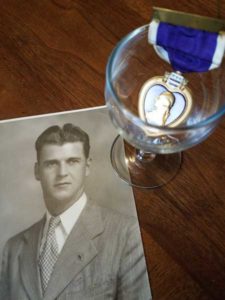

My 90-year-old mother reminded me recently of an awful day when Dad was in his final throes of alcoholism. He was home from the Veterans Administration mental hospital, where he spent most of the last six years of his life. They’d released him this time with a bottle of Quaaludes, a depressive drug that, when coupled with alcohol, makes the person swimmy drunk. Falling down drunk. They didn’t tell us that, and of course, when released, Dad went straight to his favorite beer joint. He then tried to drive home, with bad results. He backed into another car, whose incredulous driver was following him when he arrived at our house. He overshot the driveway, so he just turned a big circle in the neighbor’s yard. When the police arrived, following calls by both the driver and the irate neighbor, Dad was lying face down on the garage floor.
Around this time, Mom drove home from work. The officer made no attempt to help Dad and spoke to Mom like she was trash. Mom worked in the local bank, and we lived in a nice house. We were white. Given the racial nature of recent police shootings, I understand that this gave us a chance of being treated like humans. Still, the officer was determined to take this flailing wreck of a man to jail. Mom explained Dad’s frail condition and begged for help. The cop barely squeaked out a word.
Desperate to be listened to, Mom noted the name on his badge and made a connection. She told him that she worked with his best friend’s wife. He looked at her, startled. Suddenly, the tone changed. This time when she told him that Dad was a World War II veteran on leave from the VA hospital, he nodded. They agreed that if she got him back to the hospital they would not jail him. Suddenly, Mom was a person, not trash.
This story makes me think of the way we all judge people, from police to the angry black men who are so fed up they can’t take it anymore.
My husband has a young relative addicted to heroin. Her frantic parents try to keep track of this beloved daughter, though she frequently hides from their attempts to get her help. Last week, they got news that she was ill with infections from her needle usage. They found her and convinced her to let them take her to the emergency room. There, the doctor treated this frightened family as if they were trash. He wouldn’t even treat the young woman, saying she’d just go out and do it again. He was full of contempt, just like the scene with the cop and my mom. Unfortunately in this case, the family is Latino. They weren’t able to pull out a tidbit like knowing the doctor’s best friend to wedge their humanity inside his judgmental attitude.
Author Maia Szalavitz’s 2016 book on addiction, Unbroken Brain: A Revolutionary New Way of Understanding Addiction, concludes that people who become addicted have developmental disorders similar to autism—in childhood, many future drug addicts share similar characteristics, like sensitivity to touch and tastes. Her theory is that there are some signals in the brain that aren’t wired right, and the drugs or alcohol complete that circuit. Addicts often say that with that first taste of the drug, they suddenly felt “right.” She wants us to stop treating addicts like criminals and start treating them as people with brain disorders.
I have one final story: about my own judgment of others that led to great harm. My kids’ dad, Patrick, was addicted to marijuana. In the 1970s, we didn’t give pot much thought. Most everyone my age smoked it. I didn’t like it myself, but Patrick did. He was a veteran of the Vietnam War, and marijuana was the only thing that calmed him down. I don’t think the term post-traumatic stress disorder had even been coined then. I didn’t realize it, but I fell in love with the “stoned” Pat. He was whip-smart, politically active, and gregarious: a great partner. But as time passed, I found that the non-stoned Pat would get angry to the point of violence. Once our kids were born, I wanted him to get treatment and get over the childish (I thought) pot smoking.
So I became the scorning, judging person. I treated the stoned, happy Patrick like he was trash. But I ran from the angry Patrick in terror. We separated, and I made sure he stayed away from marijuana for the kids’ sakes. Unfortunately, my threats worked, and they grew up with a terrifyingly angry dad.
Years later, once he had died and the kids were grown, I was at an antiwar rally when a veteran took the microphone and pleaded for marijuana to become legal, saying it was the only thing that kept him and many other veterans sane. He told how it kept the demons away after the horrors they’d experienced in combat. It wasn’t until that moment that I realized what I’d done. I’d haunted Pat’s life with my haughty superiority, heaping scorn on him, just like the cop had done to my mom, and just like the doctor had done to my husband’s relatives and their heroin-addicted daughter.
Szalavicz states: “We have this idea that if we are just cruel enough and mean enough and tough enough to people with addiction that they will suddenly wake up and stop, and that is not the case.”
Thou shalt not judge. I have never seen the wisdom of that more than in these troubled days. I hope we all remain open to examining the judging we do—of people of color, the police, or addicts—and spend a little of that negative energy trying to find reasons to understand.




Thank you deeply Becky!